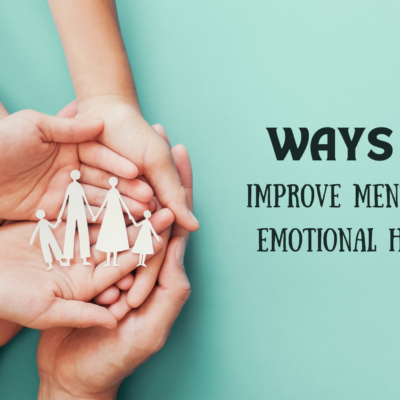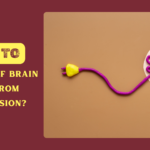Ways to Improve Mental and Emotional Health: Mental and emotional health are integral components of overall well-being. When both are in balance, they can positively affect our physical health, relationships, and life satisfaction. However, with the fast-paced, stressful nature of modern life, it’s easy for mental and emotional health to become strained. Issues such as anxiety, depression, and stress can take a toll, but the good news is that improving mental and emotional health is within our reach. By making intentional lifestyle changes, seeking support, and adopting healthy coping strategies, we can boost our mental and emotional well-being.
Also Read:
- How to Heal Yourself Mentally and Physically?
- Traits of Emotionally Unstable Personality. How to Deal with it?
- How to Quiet My Mind?
Ways to Improve Mental and Emotional Health:
Here’s a guide on practical ways to improve mental and emotional health:
Build Healthy Relationships
One of the most significant ways to improve mental and emotional health is by nurturing positive relationships with friends, family, and loved ones. Healthy relationships can provide emotional support, reduce feelings of loneliness, and increase feelings of security.
- Quality over Quantity: Focus on maintaining a few meaningful, supportive relationships rather than many superficial ones. These deep connections are more likely to provide the emotional fulfillment you need.
- Effective Communication: Open, honest communication helps build trust and understanding in relationships. Don’t hesitate to express your thoughts, needs, and emotions in a respectful manner, and encourage others to do the same.
- Set Boundaries: Healthy boundaries are essential in any relationship. They protect your mental space, help maintain a sense of control, and prevent emotional burnout. Recognize when it’s time to say “no” or take a break for your emotional well-being.
Practice Mindfulness and Meditation
Mindfulness is the practice of being present in the moment and fully engaged with whatever you’re doing, without judgment. Meditation is a form of mindfulness that focuses on quieting the mind and relaxing the body. Both practices are excellent tools for improving mental and emotional health.
- Mindfulness Exercises: Whether it’s eating, walking, or doing household chores, practice mindfulness by paying full attention to the activity at hand. Notice the sights, sounds, and sensations around you.
- Meditation: A regular meditation practice can reduce stress, increase emotional resilience, and improve cognitive function. Start with just a few minutes each day and gradually increase the duration. Apps like Headspace and Calm can provide guided meditation sessions.
- Breathing Techniques: Focused breathing exercises, such as deep breathing or box breathing, can help lower stress levels, calm your nervous system, and improve concentration.
Exercise Regularly
Physical activity is one of the most effective ways to improve mental and emotional health. Exercise promotes the release of endorphins, the brain’s “feel-good” chemicals, which help reduce stress, anxiety, and depression. Regular physical activity also improves sleep quality and boosts self-esteem.
- Cardio Workouts: Engage in cardiovascular exercises such as walking, running, swimming, or cycling. These activities increase heart rate and stimulate endorphin release, promoting positive emotions.
- Strength Training: Lifting weights or doing bodyweight exercises can improve confidence and build mental toughness. The focus on physical strength often transfers to emotional strength.
- Yoga and Tai Chi: These mind-body practices combine physical movement with mental focus, improving both flexibility and mental clarity. Yoga, in particular, can help release pent-up stress and calm the mind.
Adopt a Healthy, Balanced Diet
What you eat has a direct impact on your mental and emotional health. Eating a nutrient-rich, balanced diet can improve mood, cognitive function, and energy levels. Certain nutrients are particularly important for mental health.
- Omega-3 Fatty Acids: Found in fish (salmon, mackerel), flaxseeds, and walnuts, omega-3s play a role in brain function and emotional regulation. Studies show they can help reduce symptoms of depression and anxiety.
- B Vitamins: B vitamins, particularly B6, B12, and folate, help regulate mood and reduce the risk of depression. These can be found in leafy greens, beans, eggs, and meat.
- Antioxidant-Rich Foods: Fruits and vegetables rich in antioxidants, such as berries, spinach, and broccoli, help protect the brain from oxidative stress and inflammation, which can impact mood and cognitive function.
- Avoid Excess Sugar and Caffeine: Excessive consumption of sugar and caffeine can lead to mood swings, anxiety, and energy crashes. Aim to reduce your intake and focus on whole, nutrient-dense foods.
Get Enough Sleep
Sleep is crucial for mental and emotional health. Poor sleep can increase the risk of depression, anxiety, and irritability, and it can impair your ability to concentrate and make decisions.
- Establish a Sleep Routine: Go to bed and wake up at the same time every day, even on weekends, to regulate your body’s internal clock.
- Create a Relaxing Bedtime Ritual: Engage in calming activities before bed, such as reading, listening to soothing music, or practicing relaxation techniques to signal to your body that it’s time to wind down.
- Limit Screen Time Before Bed: Exposure to screens before sleep can disrupt your body’s production of melatonin, a hormone that helps regulate sleep. Aim to avoid screens for at least an hour before bed.
Engage in Meaningful Activities
Having a sense of purpose and engaging in activities that bring joy and fulfillment can significantly enhance emotional well-being. Whether it’s work, hobbies, volunteering, or creative pursuits, meaningful activities give you something to look forward to and provide a sense of accomplishment.
- Pursue Hobbies: Explore interests such as painting, gardening, writing, or learning a new skill. Engaging in creative hobbies promotes relaxation and improves self-esteem.
- Volunteer or Help Others: Helping others through volunteer work or random acts of kindness boosts emotional well-being and provides a sense of purpose.
- Set Personal Goals: Setting and achieving small, realistic goals helps increase motivation and provides a sense of accomplishment, which boosts confidence and self-worth.
Seek Professional Support
There’s no shame in seeking professional help for your mental and emotional health. Sometimes, it’s difficult to manage emotional struggles on your own, and talking to a therapist, counselor, or support group can offer a fresh perspective and coping strategies.
- Therapy: Cognitive Behavioral Therapy (CBT), Dialectical Behavior Therapy (DBT), and other therapeutic approaches can help you manage emotions, identify negative thought patterns, and develop healthy coping mechanisms.
- Support Groups: Joining a support group, either in person or online, can help you connect with others who understand your struggles. It can be a valuable source of emotional support and encouragement.
Manage Stress Effectively
Chronic stress is one of the biggest threats to mental and emotional health. It can lead to anxiety, depression, and burnout if left unmanaged. Learning how to cope with stress in healthy ways is vital for long-term well-being.
- Identify Stress Triggers: Recognize the situations or events that cause stress in your life, and work on strategies to either avoid or manage them better.
- Time Management: Break large tasks into smaller, manageable steps, prioritize your responsibilities, and learn to delegate when possible.
- Relaxation Techniques: Regularly practice relaxation techniques such as progressive muscle relaxation, visualization, or journaling to reduce stress levels.
Practice Self-Compassion
Being kind to yourself and practicing self-compassion is essential for emotional well-being. Many people are highly self-critical, which can exacerbate feelings of anxiety, depression, and inadequacy.
- Avoid Self-Criticism: Instead of berating yourself for mistakes, practice positive self-talk and focus on what you’ve learned from the experience.
- Acknowledge Your Strengths: Take time to recognize your strengths and celebrate small victories, even if they seem minor.
At The End
Improving mental and emotional health is a multifaceted process that requires attention to various aspects of life, including relationships, physical health, and emotional well-being. By focusing on building supportive relationships, adopting healthy habits, managing stress, and seeking professional help when needed, you can foster better mental health and emotional resilience. Small, consistent changes over time can have a profound impact on your overall quality of life, enhancing your ability to cope with challenges and lead a happier, healthier existence.








